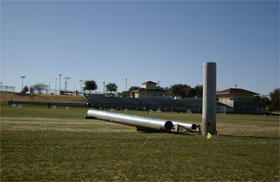In the past, nightfall meant an empty Garvey-Rosenthal Stadium, but the installation of new light fixtures will mean play can continue.Athletics Director Danny Morrison said having light fixtures will make scheduling matches easier.
“It gives you an opportunity to play matches at night,” Morrison said. “It gives flexibility to position matches at the best time for both players and fans.”
Associate Athletics Director Ross Bailey said planning to install the light fixtures began three years ago, but the project had to go through a process of university approval. Installation is to be completed by mid-March.
The fixtures are entirely funded through donations to the department and the project will cost about $200,000.
“It helps elevate our program and increases fan enjoyment,” Bailey said.
Bailey said TCU hired Lone Star Electric Co. to assemble the fixtures, which will be provided by Musco Sports Lighting, a company that supplies both permanent and temporary lighting for athletic fields.
The fixtures will be put together in five pieces, with a concrete base and pole-top light assembly. The lights will operate based on foot-candle measurements, a measurement of the light intensity on a surface. Bailey said the U.S. Soccer Federation standard for a field the size of Garvey-Rosenthal Stadium is 50 foot-candles.
Though the stadium was built in 1999, women’s head soccer coach Dan Abdalla said it is still a quality facility.
“It’s definitely comparable to the top facilities in the country,” Abdalla said.
Abdalla said he hopes the new lights will bring more fans to matches. Through nine home matches in the fall of 2005, the women’s soccer team averaged 674 people in a stadium capable of holding 1,500.
Morrison said soccer matches can now become family events.
“We are excited about having lights in the stadium,” Morrison said, “and the ability to play at night where people can bring families to matches.

